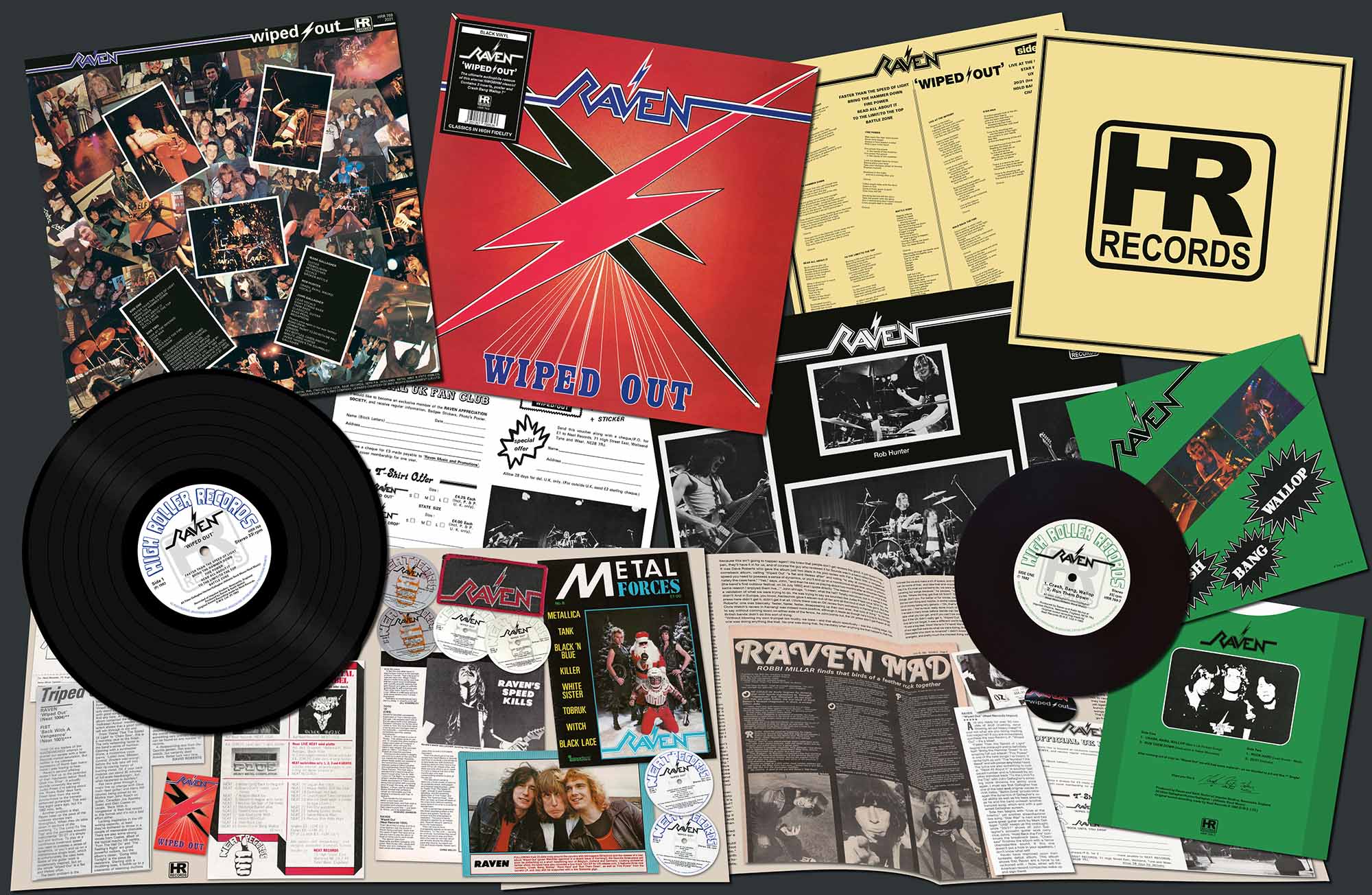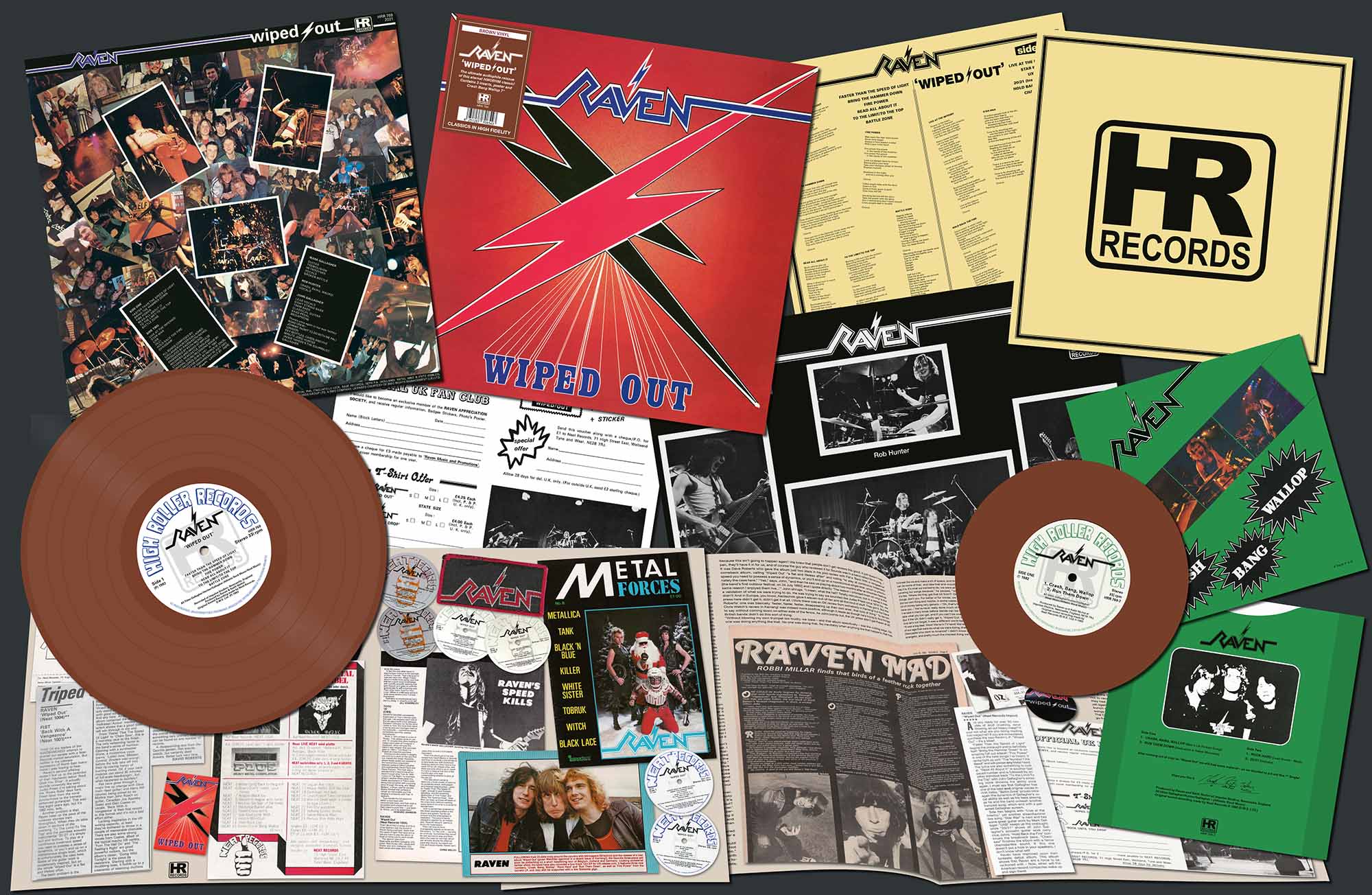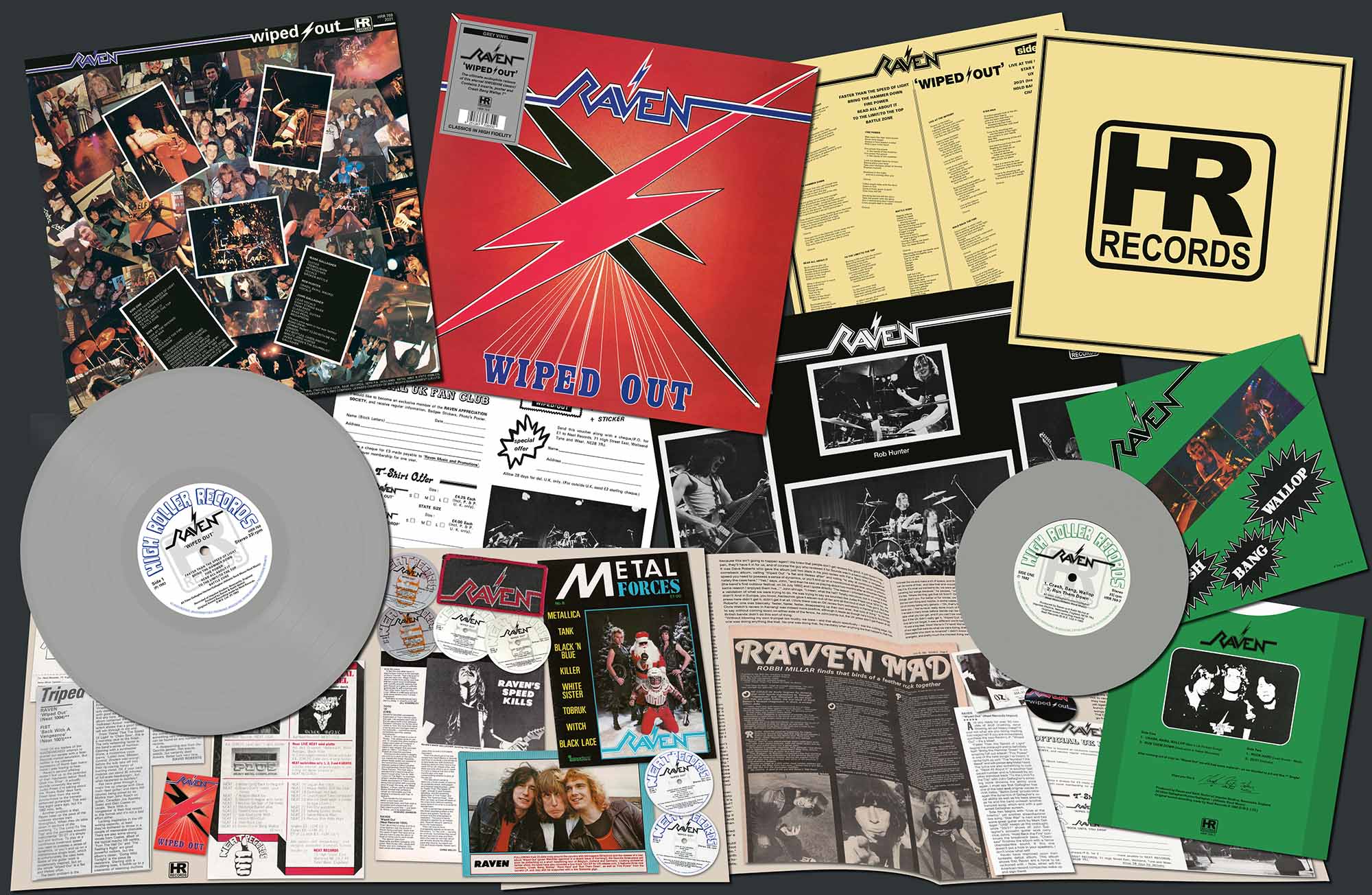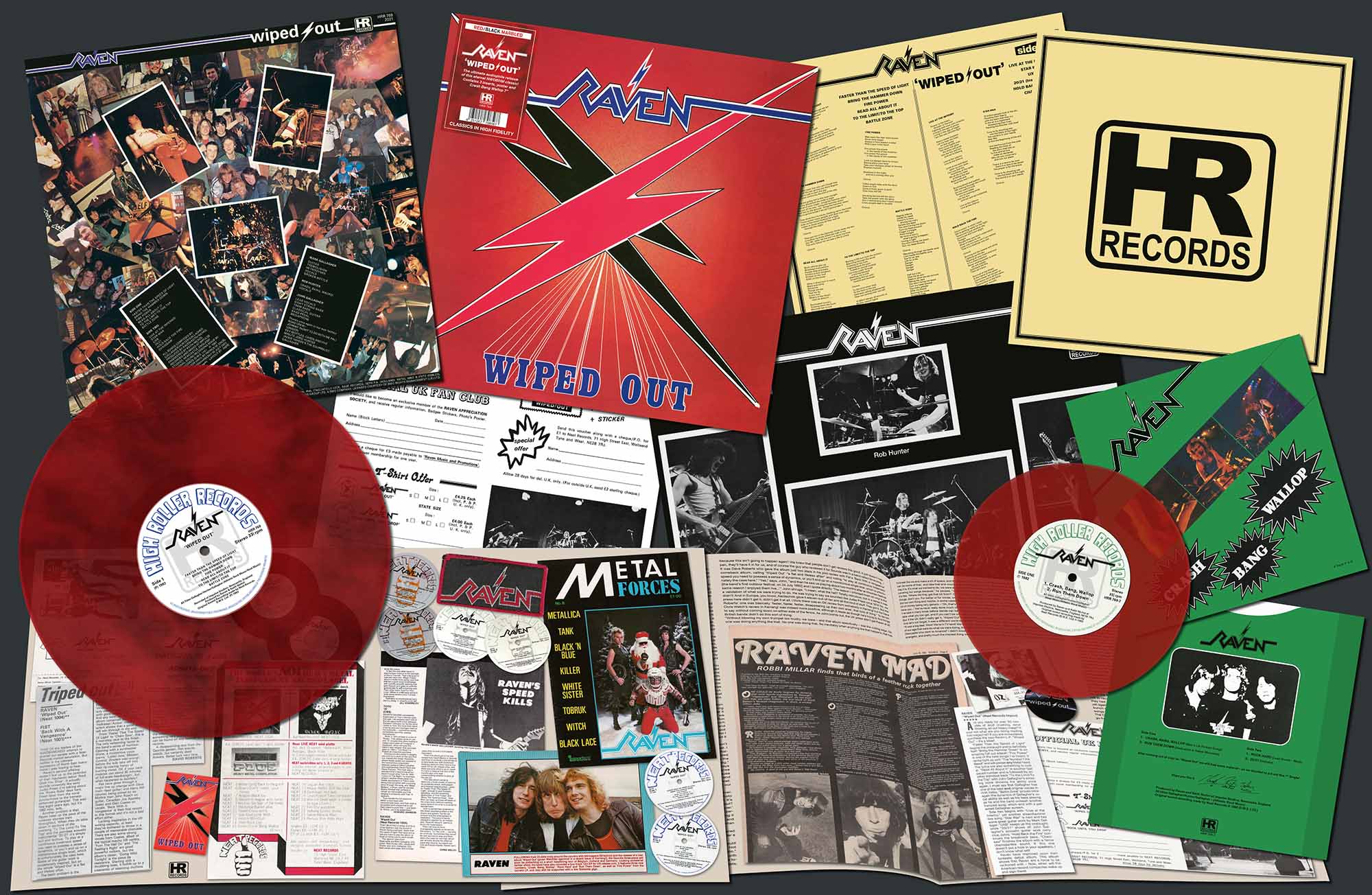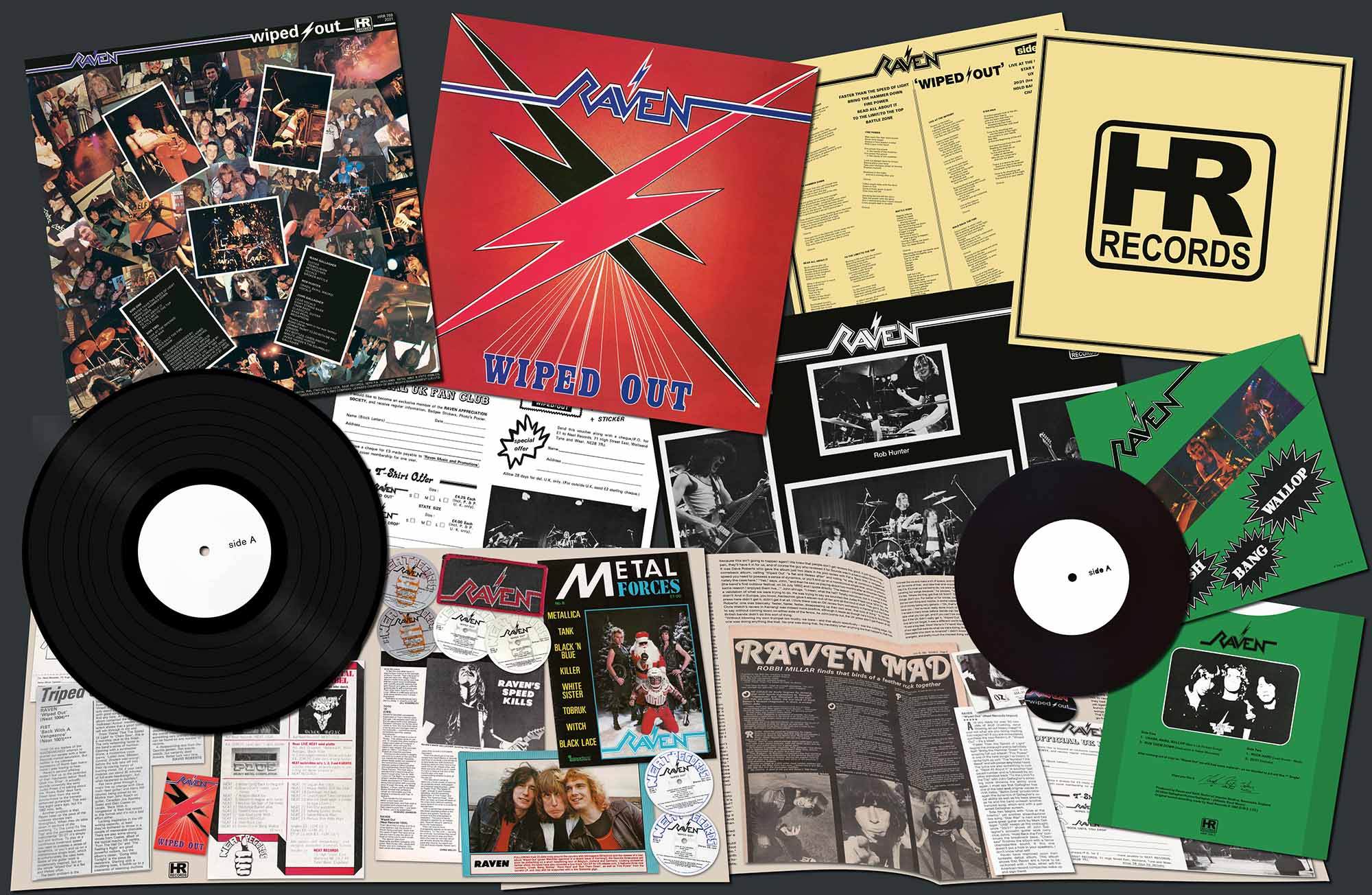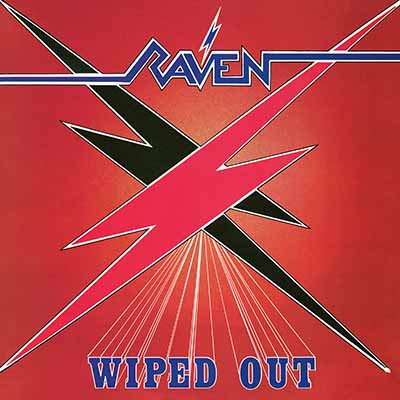 | ||||
| RAVEN - Wiped Out LP+7" | |
HRR 769, ltd 1000, 350 x black, 350 x brown, 200 x grey + 100 x red/ black marble vinyl (HRR mailorder exclusive), 425gsm heavy cardboard cover with 5 mm spine, poster, lyric sheet, 4 page insert, A4 insert, bonus 7" with p/s | |
| Mark Gallagher - guitar, vocals Rob Hunter - vocals John Gallagher - lead vocals, bass, guitar | |
| 01 Faster than the Speed of Light 02 Bring the Hammer Down 03 Fire Power 04 Read All About It 05 To the Limit - To the Top 06 Battle Zone 07 Live at the Inferno 08 Star War 09 UXB 10 20-21 11 Hold Back the Fire 12 Chain Saw | 13 Crash Bang Wallop 14 Run Them Down 15 Rock Hard 16 20-21 (Outtake) |
AVAILABLE | |
Original transfer, audio restoration and mastering by Patrick W. Engel at TEMPLE OF DISHARMONY in July 2020. Cutting by SST Germany on Neumann machines for optimal quality on all levels...
The ultimate audiophile reissue of this eternal NWOBHM classic!
Unlike many bands, Raven didn’t suffer from ‘difficult second album’ syndrome. Despite the fact that the Newcastle-based trio’s debut LP ‘Rock Until You Drop’ was only released in September 1981, the following summer saw its successor ‘Wiped Out’ in the racks. “One thing this band’s never had,” suggests bassist/vocalist John Gallagher emphatically, “is a lack of material.”
Although they’d been in existence in one form or another since 1974, Raven’s break came at a gig at Balmbra’s in the centre of Newcastle in 1980 that set the (wrecking) ball rolling. In the audience were the Tygers Of Pan Tang, whose debut single had been released by Neat Records at the end of 1979, and their managers, Tom Noble and Graeme Thompson. After the show the pair suggested the band – John, his guitarist brother Mark and drummer Rob Hunter – get in touch with a view to doing a demo at Impulse Studios, which was also home to Neat.
So, on 6 May 1980 the trio found themselves at Impulse recording their demo, which gave way to a well-received single ‘Don’t Need Your Money’ b/w ‘Wiped Out’ – Neat’s fourth ‘real’ seven-incher – and when the time came for the label to branch out into the LP market, it was Raven who were chosen to spearhead the assault. ‘Rock Until You Drop’ was recorded piecemeal through 1981 (producer Steve Thompson – Graeme’s brother – was adamant he would only work with the band for three days a week as they were so intense) but the final outcome was a much-lauded release which copped a full five-star review at the hands of Geoff Barton in Sounds music paper. “The best album to emerge out of the NWOBHM since Saxon’s ‘Wheels Of Steel’,” he wrote. Fans voted with their wallets, and ‘Rock Until You Drop’ broke into the UK Album Chart; not a bad result for a small independent label and a band’s debut album.
The thing that made Raven stand out from the pack was that they were different, right from the start. No one sounded like them, nor played with their intensity. At that time, they were very much leaders in a field of one. “A lot of people I knew – roundabout ’79, ’80, ’81 – were buying everything that was being released back then, and we’d either pool resources, or I’d hear stuff on the radio and really like it and I’d buy it,” says John. “But as I’ve said about the New Wave Of British Heavy Metal, at a certain point I never heard any of it, and I had no real interest in hearing any of it, either because it was distracting or because I didn’t want to be overly influenced by it. You know, let’s have another song that goes [he sings"> ‘du-du-dah, du-du-dah...’ – ‘Two Minutes To Midnight Part Ten’,” he laughs. “So it’s actually nice to go back and hear some of that stuff now.”
Given the success of their debut LP, a second album was never in question. “Once we’d done ‘Rock Until You Drop’, which of course did really well,” John recalls, “we played here, there and everywhere and so doing ‘Wiped Out’ was just a natural progression – we’ve got to do another record.” But, unlike its predecessor, the sessions for the second album were a lot more focussed. “‘Wiped Out’ was done in maybe six or seven days, along with the songs that are on the ‘Crash Bang Wallop’ EP. The whole thing, recorded and mixed, and during that period about three or four songs were actually written in the studio as we were recording, which is ridiculous... I think ‘Battle Zone’ was written on the spur, half of ‘To The Limit/To The Top’ was written right there on the spur, it was just very creative craziness. We did stupid hours: fourteen, fifteen, sixteen hour days. We just banged it all out. We had most of the record already, though. You can see on the cover of ‘Rock Until You Drop’ there’s a setlist and it’s got ‘Chainsaw’ written on it so that one, for example, was already written and being played at that point. But we basically recorded pretty much everything we had then.”
Unlike ‘Rock Until You Drop’, which had featured that original single plus had another 7”– ‘Hard Ride’ – drawn from it, there was no single as such taken from ‘Wiped Out’. Instead, Neat issued a companion 12” EP featuring the rest of the songs from the session. “We figured the ‘Crash Bang Wallop’ song had ‘single’ written all over it compared to most of the other ones, so that was a no-brainer for such a release. And then we figured that as we had so much material, we could do an EP. But I can’t remember exactly how we decided what went on it. ‘Run Them Down’ ended up going on there, although that could have very easily been on the album, just as much as anything else. ‘Rock Hard’ was a bit of a novelty just because Mark was singing it and it was rock ‘n’ roll and catchy, so OK, put it on with the EP too. And we figured we’d just put one off the album just to sweeten the pot so we used ‘Fire Power’. And the idea was to do it in coloured vinyl which was a bit of a novelty back then and I think we had red, green, blue, purple, whatever and then in the end they just threw all the vinyl into a pot, mixed it up and had what we called ‘splodge’ vinyl so there’s some of that out there as well,” he laughs.
As for how Mark ended up making his lead vocal debut on the EP, “Well, he wrote the words so I said, ‘Why don’t you sing it, just for a goof?’ He’s got that real, gritty, powerful kind of Bon Scott-y thing going on, which is great. I mean, you can hear on the live album that we put out in 2019 [‘Screaming Murder Death From Above: Live In Aalborg’"> that the backing vocals sound like ten people singing at once, so he’s like the secret weapon! We figured we’d trade off between the two voices a little bit which sounded great. It’s a real fun song to play, and it has the rockabilly guitar, a real nice solo, and there’s that little ‘Anchors Away’ part at the end. It’s just a really good song.”
Fans of the band will be no strangers to the little snippets or motifs that Raven play on in their songs. “Always have done, always will,” nods John, “because we figure that you want to basically lull people into a false sense of complacency and then prick them with little bits of fun stuff. You can’t play the fun stuff all the time because otherwise it passes over people’s heads, and then it turns into a Dream Theater album. So you’ve got a song, and then you hit people with surprises – you can have hooks, and sometime those little parts turn into hooks as well. You know, ‘Rock Until You Drop’ has that reggae part, and all the little breaks with the solo parts, and that’s our bread and butter, really. It’s what we do.”
But with ‘Wiped Out’ in the can, the band found themselves in hot water over their proposals for its front cover. “What a nightmare! We had the cover all set. As far as we were concerned it was all ready to go. It was a photo of a nuclear explosion. And when Woodsy got to hear that” – John pulls a face – “he said, ‘You can’t do that. It’s terrible. Terribly bad taste.’ Bad taste? He’s been putting Venom out!” he laughs. “What are you talking about? But he wouldn’t have it. He locked me and Rob in a room and said, ‘You’ve got an hour, come up with a cover.’ So I drew that. And as you can see, when the ‘layout person’ Magda got hold of it, I guess dimensions and perspective never really came into it. It looks like it was drawn in an hour after we gave it to her. But, the one thing it did was stand out, for better or for worse. The back was already planned out, the collage of all the photos, and that was OK. We spent forever doing that and five minutes doing the front! But, as I said, it did stick out when you saw it in the racks.”
The other thing that sticks out is that there was no title track, as the song ‘Wiped Out’ itself had already appeared as the B-side to ‘Don’t Need Your Money’ a year previously. “Well, it seemed suitably perverse to name it after a track that wasn’t actually on the album, and the title did fit. One listen and you were ‘Wiped Out’!
“That album got us to play more in Europe, and to America, and what have you. It did well for us. The mix could have been better, I’ll admit, but it’s all there. I love the songs and in my opinion the playing is out of this world. Not everyone ‘got it’ at the time but we didn’t care: we’d completed our mission to put the live show into the studio.”
After the plaudits their debut album received, you would have expected the band to have been disappointed with the less-than-enthusiastic attitude of the UK music press to ‘Wiped Out’. “Actually, no,” John responds. “We totally expected that anyway. When we saw the reviews for ‘Rock Until You Drop’ it was like, ‘Enjoy it while it lasts, because this isn’t going to happen again’! We knew that people don’t get reviews this good, it just doesn’t happen, they’ll have it in for us, and of course the guy who reviewed it for Sounds was in a band called Silverwing...”
It was Dave Roberts who gave the album just two stars in his joint review with Fist’s ‘Back With A Vengeance’ comeback album, calling ‘Wiped Out’ “a flat and lifeless affair” and noting “to play at continuous breakneck speed you need to possess a sense of dynamics, or you’ll end up on a monotonous single level, which is unfortunately the case here.” “Yes,” says, John, “and then he saw us playing about two months after at Wrexham festival [the band’s first outdoor festival, on 24 July 1982"> and I quote directly ‘The reason I criticised them on vinyl is the same reason I enjoyed them live...’” John shrugs. “I mean, what the hell? Totally ridiculous, but in a sense it was a validation of what we were trying to do. He was trying to say we sounded like Judas Priest circa 1974! No, we didn’t! And in Europe, you know, Aardschok gave it eleven-out-of-ten and all this kind of stuff. They got it. But the press here didn’t get it, didn’t get it at all. I think there was an OK review from somebody in Kerrang! but the Dave Roberts’ one was basically ‘faster, faster, faster, disappearing up their own arse’, that kind of thing.” To be fair, Chris Welch’s review in Kerrang! was indeed more positive, although it reads as though he’s trying to find things to say without coming down on either side of the fence. As John points out, the UK press didn’t get Raven at all. British bands didn’t do this sort of thing.
“Without blowing my own trumpet too loudly, we were – and that album specifically – was the cutting edge. No one was doing anything like that. No one was doing that. So inevitably when anything like that happens, that has to break the ice and make a bit of space, and then there’s somebody going to come along behind and go ‘Oh, we can do some of that,’ and take that and mould it and manipulate it into whatever is the next level. But that’s the way it is. It’s what we wanted to do, we were already doing something that was... Well, we don’t get a lot of people covering our songs because,” he pauses, “well, I don’t think they can! I’ve heard the odd cover and inevitably it’s like, ‘Where did they get that bit from?’ Or, ‘That bit’s wrong’... You know, you get very precious about such things, don’t you. For better or for worse, we were a very idiosyncratic band. We’d have our own sound and we did our own thing and maybe, in some cases, that’s hurt us. It’s a lot easier to be generic and bands can make a lot of money being very generic – ‘Oh, that’s familiar, I’ve heard that before, sounds like this AC/DC song or what have you...’ We’ve never really done much of that at all. Tried to avoid it, in fact...”
I’ve said it many times before: bands can be influential or bands can be rich. “Rarely both!” he laughs. “But you take what you can get, and if you can’t be one, let’s be the other...”
But if the UK didn’t really get it, ‘Wiped Out’ took Raven to America, where it was a wholly different ball game. And let’s not forget, it was a different world back then. Going to America was a big deal.
“It was a big deal. Wow! We’re in TV land! We’re in New York. Oh my God... Back then, there weren’t many people of our age that were do what we were doing, that had the ability or the opportunity, and, you know, three kids from Newcastle who went to America? I didn’t know anyone who’d been to America. And the crowds were incredibly energetic, and pretty much the craziest thing we’d ever seen. It was similar to maybe playing in Italy and Holland, which were the craziest places we’d been too before, but kicked up a little bit more. And it just made an awful lot of sense. It’s like, here’s a huge market, everyone speaks English, everything’s open 24 hours a day, it’s built for bands to go and tour...”
And the Americans understood what Raven were all about... “Absolutely,” he replies, emphatically.
Jon Zazula – Jonny Z – of New York-based metal indie label Megaforce Records had gone overboard for Raven and wanted them to play his Great Halloween Headbangers Ball event. “Ah, that first show... 30 October 1982, St George’s Theatre, Staten Island. An old theatre. We get there in the afternoon, get the odds and sods of gear together – there was a borrowed drum kit, I think we brought our amps, and Anvil were providing all the speaker cabinets. We’d met them a few days earlier and got on like a house on fire. We get there and Riot are standing around on stage soundchecking for about five hours. So there’s a frantic rush, we get all our stuff up and we start playing and from what I’m told the Riot guys got to the stage box and were plugging the bass guitar in the vocal channel and the vocals in the kick-drum channel and so on. The bad, idiotic stereotype of the main band trying to screw over the opening bands. And it didn’t work. I think by the end of us playing and the end of Anvil playing half the people left. And Riot never deigned to say hello through the whole thing. Which is a shame, because some of the early Riot stuff is great. But as people? No. No thanks. It’s every bad stereotype you’ve ever heard. It’s stupid. It’s a show, and if you’re the headliner you want a great opening band to kick your arse every night so you go out and raise your game. And who wins? Everybody. When an audience is watching a band, it’s really obvious, even to anyone who’s unsophisticated musically or equipment-minded, when it’s dreadful and it’s not because of the band. There’s a lot of difference between a band being dreadful, and a band sounding dreadful.”
Raven and Anvil then went out to play a handful of shows around the New York area, all of which were well received. The highlight for Kick Ass’ magazine’s Bob Muldowney, whose lengthy tour report was later published in Raven’s ‘Athletic Rock’ newsletter, was the final night’s encore when all three members of Raven joined Anvil onstage for a romp through 'Born To Be Wild'. "For true HM headbangers it was five minutes of pure HM ecstasy, a dedication to the man responsible for the preceding two weeks of heavy metal mayhem, Jon Zazula, and a fitting climax to the two heaviest weeks of molten metal madness ever experienced in New York..."
Jonny Z saw the band’s potential and perhaps had the foresight to realise that their future lay in America. As such, he proposed that they return to the States the following year for a full tour, an offer which the Gallagher brothers and Rob Hunter would have been foolish to turn down. The only problem was, though, that it was unlikely that the limited resources of Neat Records would be able to help the band realise their ambitions.
In addition, in January 1982 Raven had been invited to record a session for BBC Radio One’s The Friday Rock Show. ‘Hard Ride’, and ‘Lambs To The Slaughter’ from ‘Rock Until You Drop’, were put to tape, together with two songs from the then upcoming ‘Wiped Out’ – ‘Chainsaw’ and ‘Hold Back The Fire’. The band’s experience of their day at the BBC’s Maida Vale studios had opened their eyes to the shortcomings of Impulse and the trio resolved not to record there again – they were committed to doing ‘Wiped Out’ there, but that would be their last. And they had quite radical ideas as to how their third album should sound. Rather than trying to outrun themselves yet again with a faster record still, the next one would be slower but more powerful. “I’ve recently found a whole bunch of tapes,” says John, “and you can hear, here and there, there’s the inklings even in ’82 of some of the songs that would go on to form ‘All For One’. Odd riffs of things like ‘Take Control’ and a rough version of ‘Break The Chain’. When it came to doing our third album it was pretty much a matter of, ‘We’ve got a blank slate, let’s go from here’.”
John Tucker June 2020
